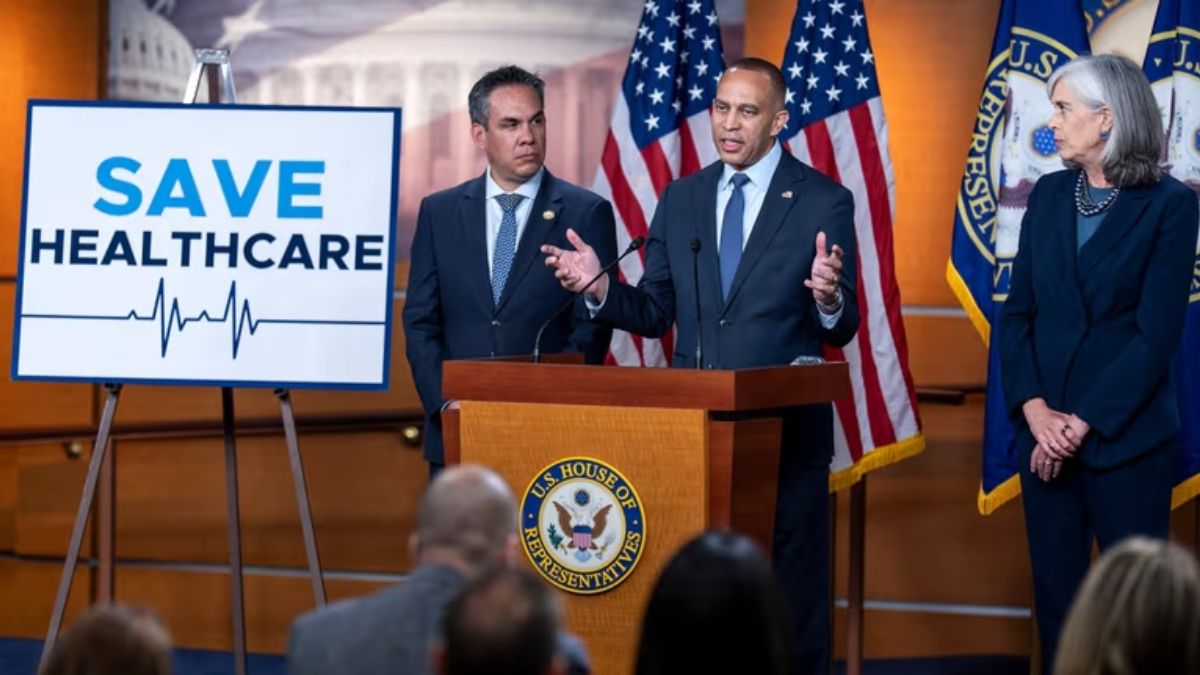During a recent telephone town hall with Maryland Representative Andy Harris, leader of the House Freedom Caucus, the very first caller wasted no time asking about health insurance. Lisa from Harford County, Maryland, explained that her cousin’s disabled son could lose the coverage he gained through the Affordable Care Act (ACA).
“She’s now facing premiums two or three times higher than before,” Lisa said. “What exactly is the Republican plan for health insurance?”
Harris, a seven-term GOP lawmaker, admitted there was no clear answer yet. “We’re trying to find ways to lower premiums,” he replied, suggesting Congress might “negotiate some kind of off-ramp” later.
His uncertainty reflected a long-standing Republican struggle — nearly 15 years after Obamacare’s creation, the party continues to criticize it without agreeing on a replacement.
Shutdown Intensifies the Obamacare Debate
The ongoing government shutdown, now in its fourth week, has sharpened partisan divisions. Democrats want to extend the ACA premium subsidies that expire at the end of this year, arguing they are essential to keep health plans affordable.
Republicans, including former President Donald Trump, have said they’ll only consider an extension after Democrats vote to reopen the government. Meanwhile, insurers have already started sending notices about premium hikes for 2026.
At town halls nationwide, frustrated voters are asking for clarity while no unified Republican proposal exists. With midterm elections approaching, health care affordability is fast becoming a major political issue.
GOP’s Unclear Strategy and Budget Implications
Trump has repeatedly promised a “better alternative” to Obamacare. “The cost is out of control,” he posted on Truth Social in late 2023. “I’m looking seriously at new options.”
However, nearly a year into his presidency, no detailed plan has emerged. Dr. Mehmet Oz, the administrator of Centers for Medicare and Medicaid Services, recently said he believes the president has a plan — but provided no specifics.
A Congressional Budget Office (CBO) analysis released in September projected that keeping the enhanced tax credits permanently would increase the federal deficit by $350 billion between 2026 and 2035, but it would also expand coverage by 3.8 million people by 2035.
House Speaker Mike Johnson has rejected the idea of continuing the subsidies, calling them “a bailout for bad policy.” He insisted Republicans are working on market-driven reforms that “rely on the private sector and individual providers.”
Pressure Builds as Enrollment Season Nears
With open enrollment for ACA plans starting November 1, many Americans are learning their monthly premiums will increase sharply. In Idaho, Rep. Russ Fulcher told constituents that “government-run health care is the wrong path.” In Texas, Rep. Brandon Gill said Republicans aim to cut waste and fraud instead of expanding subsidies.
In Maryland, Harris told callers that rising premiums are simply “returning to pre-COVID levels.” Yet, data from KFF, a nonpartisan health policy group, shows that ACA enrollment has more than doubled since 2020, reaching over 24 million people in 2025.
Voters like Sara from Michigan voiced fears that a 75 percent rise in premiums could push millions to go uninsured. “We need a real plan,” she urged. Rep. John Moolenaar responded that negotiations could still yield a workable solution once the shutdown ends.
Internal GOP Divide Deepens
Even as Republican leaders promise to revisit the issue, many within the party oppose any subsidy extension. Brian Blase of the Paragon Health Institute said there’s a growing belief among Republicans that maintaining the status quo is “financially destructive.”
Michael Cannon from the Cato Institute revealed he’s working with several GOP offices to promote alternatives, including letting subsidies expire and expanding short-term health plans outside the ACA marketplace.
Conservative groups like the Club for Growth are also pressuring lawmakers. Its president, David McIntosh, warned Republicans not to extend “COVID-era subsidies,” arguing, “People had a great deal during the pandemic, but now it’s time to pay for health care again.”
Democrats See Political Opportunity
Democrats, remembering their 2018 House victory that followed GOP efforts to repeal Obamacare, believe history could repeat itself. Polls by AP-NORC show about 40 percent of Americans trust Democrats more on health care policy, compared with 25 percent for Republicans.
With millions of Americans depending on ACA coverage and notices of rising premiums arriving in mailboxes, health care reform could once again shape the outcome of national elections.
The Affordable Care Act debate remains a central fault line in U.S. politics. As premiums rise and the shutdown drags on, Americans are left uncertain about their health insurance future.
While Democrats push to preserve subsidies, Republicans remain divided, balancing fiscal conservatism with public pressure for affordable coverage. Unless Congress acts soon, millions may face higher costs — and both parties will face the consequences at the ballot box.



